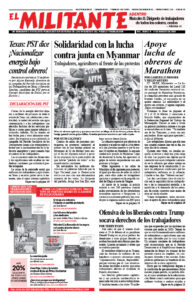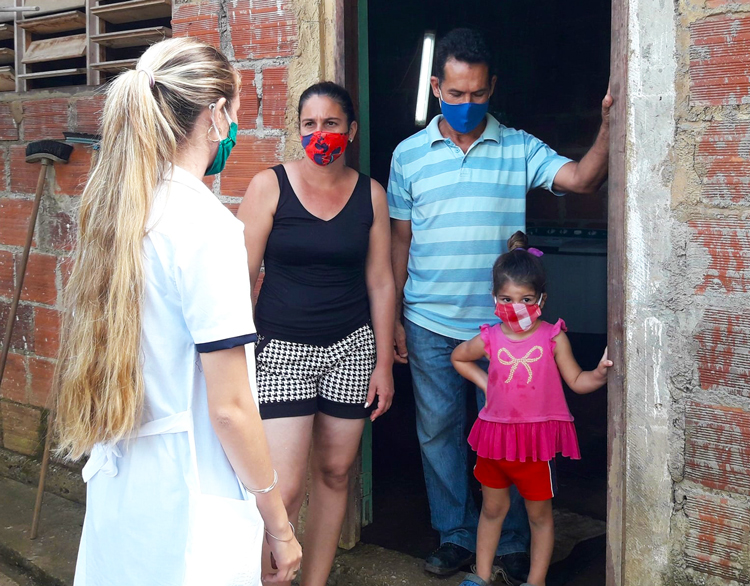Pharmaceutical institutions in Cuba are gearing up to produce 100 million doses of Soberana 2 — one of four vaccines against COVID-19 in development there — by the end of the year.
It will soon be given to 42,000 Cuban volunteers for the final stage of clinical trials. The Cuban daily Granma reports the first 150,000 doses have been produced, with more on the way. A vaccination drive is being prepared that will make Cuba one of the first countries to inoculate its entire population by the end of 2021.
This follows the government’s mobilization of working people over the last year to knock on people’s doors across the island to see if anyone feels sick or needs help. No one was left on their own.
Cuba will be the first Latin American country to produce its own vaccine. The name Soberana, Spanish for “sovereign,” underscores the Cuban people’s longstanding struggle to defend their independence from U.S. imperialism.
Similar trials for Soberana 2 are under negotiation or underway in Iran and Mexico. “The spread of the virus is not very high in Cuba,” said Dr. Vicente Vérez, director of the Finlay Vaccine Institute in Havana, Jan. 26, “that’s why we’re using larger samples of population in phase 3” trials from other countries to confirm its effectiveness.
After a year of action by the Cuban people that limited the spread of illness and deaths, Cuba is now grappling with a surge of infections. In mid-February confirmed cases climbed to 900 a day for the first time. Cuba reopened the island to tourists and foreign travelers recently. Even with strict controls, this facilitated the increase.
While those figures are still tiny compared to other countries, they are serious enough to place additional strains on the country’s resources.
The “COVID-19 mortality rate in the world is above 2%,” said Dr. Eduardo Martínez Díaz, director of Cuba’s Biotechnologic and Pharmaceutical Industries Group, Feb. 4. “In our country it’s at 0.74%, but we’re deeply saddened by the death of 220 Cubans,” he added, expressing the conviction that guides the country’s government that every life is precious — no matter how old or young.
The U.S. rulers’ economic war on the Cuban people and their socialist revolution is having a serious impact on the country’s ability to produce and buy medication and supplies, said Martínez. No other country has ever been subject to such a severe or long-lasting embargo.
Its brutal consequences are felt in the gathering of raw materials to produce vaccines. Some vendors refuse to sell the components we need, explained Dr. Eduardo Ojito, director of the Center for Molecular Immunology. They cite U.S. restrictions banning sales to Cuba of medical supplies that contain more than 10% of U.S.-made products.
“But medication to treat COVID is a priority,” Martínez said, “to save lives.” Less than 3% of infected patients in Cuba develop serious illnesses, he explained, compared to more than 10% in the rest of the world. “Our medical personnel and the COVID treatment they provide are responsible for saving these lives.”
A product of the revolution
Cuba’s medical and scientific achievements are possible because of the conquests working people made when they took power out of the hands of the capitalist rulers and their backers in Washington in 1959. Internationalism and solidarity have been a hallmark of the Cuban Revolution ever since. In developing a vaccine, the Cuban government aims to not only inoculate its own population, but to make it available to working people in other countries.
Cuban doctors and nurses have been at the forefront of treating people infected with COVID around the world. More than 200 arrived in Panama, the Central American country with the largest number of COVID cases, at the end of December. Prior to requesting Cuba’s help, the Panamanian government’s appeals for aid had been rejected by eight other governments, including Washington.
“Not enough vaccines are being produced worldwide,” said Martínez. “Only 108 million doses have been administered so far. That’s just a little over 1.4% of the world’s population!” With production and distribution controlled by big pharmaceutical monopolies, he said, the vaccines are inaccessible to most countries.
U.N. Secretary General António Guterres announced grim figures Feb. 17 — some 75% of all vaccinations have been administered in just 10 countries. Government programs in more than 130 countries have yet to receive a single dose.


